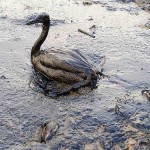Obama's Katrina?

Things are going from bad to worse in the Gulf of Mexico.
Why are we surprised? An oil well blowout in 50 feet of water is hard to get a handle on. A blowout in the black depths a mile below the waves is an order of magnitude more difficult to manage, increasing the risks that a spill will turn catastrophic.
Knowing those risks, BP and the oil industry at large should have been straight about the hazards when pressing for expanded deepwater oil drilling. They weren’t.
Knowing those risks, the Obama administration should have been quicker on the draw with its disaster response when the Deepwater Horizon rig blew up April 20. They weren’t.
So, here we are. The metastasizing oil slick has reached shore, threatening ruinous damage to one of the world’s great commercial fisheries and the habitat for scores of waterfowl and other wildlife species.
It could get worse. The Wall Street Journal on Friday quoted industry experts' estimates that the blown-out well could be leaking 25,000 barrels of oil per day, which is five times higher than the earlier estimate, which was five times higher than the estimate before that.
At that rate, the spill would be in the Exxon Valdez’s league in less than two weeks.
Unlike the Exxon Valdez, which contained an easily measured quantity of crude oil, the leaking well is emptying a reservoir of indeterminate size.
Unlike the Exxon Valdez, which spilled oil onto a rocky shore that could be hosed and scrubbed down, the Gulf spill threatens to contaminate boggy bottomlands that would be impossible to clean.
No one is likely to come out of this fiasco smelling like a rose. Nor should they.
Start with BP. With memories still fresh of the deadly explosion at its Texas City refinery and its leaky, corroding pipelines in Alaska, BP has acquired a Keystone Kops reputation that belies its aspiration to be perceived as a different kind of “Beyond Petroleum” oil company.
The administration, desperate to avoid the incompetence rap that tarred its predecessor following Katrina, isn’t doing itself any favors either. It played down the danger of a disastrous leak immediately after the explosion, prematurely declared that the blowout preventer had been triggered, and put out a statement that the surface slick was merely the residual aftermath of the rig explosion. Homeland Security waited nine days before asking the Defense Department to lend a hand.
It’s not fair just yet to call the administration’s response Katrina: The Sequel. But it’s fair to start asking hard questions.
Down in Plaquemines Parish, where the Mississippi River meets the sea, the locals say they can already smell the slick's foul odor. The longer the situation remains out of control, the farther the odor of this fiasco is likely to spread.